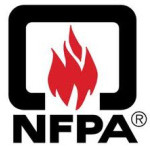- Industria: Fire safety
- Number of terms: 98780
- Number of blossaries: 0
- Company Profile:
Established in 1896, NFPA's mission is to reduce the worldwide burden of fire and other hazards on the quality of life by providing and advocating consensus codes and standards, research, training, and education.
A material such as adhesive, insulation, coating(s), and film used to line the inside surface of a duct, fan casing, or duct plenum.
Industry:Fire safety
A material such as an adhesive, insulation, a coating(s), or film used to line the inside surface of an air duct, fan casing, or duct plenum.
Industry:Fire safety
A material such as an adhesive, insulation, banding, a coating(s), film, or a jacket used to cover the outside surface of an air duct, fan casing, or duct plenum.
Industry:Fire safety
A material that has a vapor pressure not exceeding 40 psia (2068. 6 mm Hg) at 100°F (37. 8°C).
Industry:Fire safety
A material that has a melting point, decomposes, or sublimes at a temperature greater than 68°F (20°C).
Industry:Fire safety
A material that has a vapor pressure greater than 300 kPa absolute (43. 5 psia) at 50°C (122°F) or is completely gaseous at 20°C (68°F) at a standard pressure of 101. 3 kPa absolute (14. 7 psia).
Industry:Fire safety
A material that is a gas at 68°F (20°C) or less at an absolute pressure of 14. 7 psia (101. 325 kPa), that is ignitable at an absolute pressure of 14. 7 psia (101. 325 kPa) when in a mixture of 13 percent or less by volume with air, or that has a flammable range at an absolute pressure of 14. 7 psia (101. 325 kPa) with air of at least 12 percent, regardless of the lower limit.
Industry:Fire safety
A material that is applied to a substrate and designed to protect it from the thermal effects of a fire.
Industry:Fire safety
A material that is capable of sustaining a reaction front that moves through the unreacted material at a speed equal to or greater than that of sound in that medium ; a material capable of sustaining a detonation.
Industry:Fire safety
A material that is composed predominantly of any of the following hydrocarbons or mixtures of them: propane, propylene, n-butane, isobutane, and butylenes.
Industry:Fire safety
